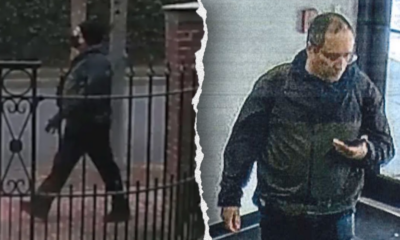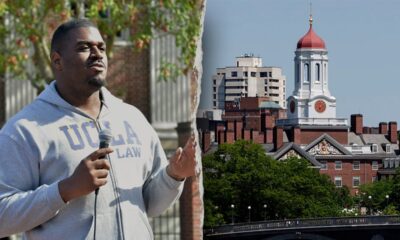Massachusetts
Massachusetts middle schooler banned from wearing ‘only two genders’ shirt loses federal appeals case

The local middle schooler who was barred from wearing an “only two genders” shirt to school has lost his federal appeals case, as his attorneys consider a Supreme Court appeal.
The U.S. Court of Appeals for the 1st Circuit in Boston has ruled against Middleboro student Liam Morrison in the high-profile First Amendment case.
Liam, now in 8th grade, last year was banned by school officials from wearing a shirt to school that read, “There are only two genders.” The 7th grader then wore a shirt that stated, “There are censored genders,” and again, he was ordered to take off the shirt.
A U.S. district judge previously ruled in favor of the Middleboro school officials, and the appeals court over the weekend affirmed the district court’s ruling.
“This case is about much more than a t-shirt,” a lawyer for the Massachusetts Family Institute said in response to the appeals court ruling. “The court’s decision is not only a threat to the free speech rights of public school students across the country, but a threat to basic biological truths.”
“While we are disappointed in this decision, we aren’t done fighting yet,” the attorney Sam Whiting added. “Along with our partners at Alliance Defending Freedom, we are reviewing all legal options, including appealing to the United States Supreme Court.”
The Middleboro school district each year celebrates Pride month, hanging Pride flags and sending the message that there are “an unlimited number of genders,” one of Liam’s lawyers had argued in front of the appeals court.
In response to the school’s view, Liam wore the controversial shirt to Nichols Middle School last year.
School officials in response to the shirt told Liam to either take off the shirt or leave school for the day. Liam chose to miss the rest of his classes that day.
When the Middleboro principal pulled Liam out of class and told him he had to take off his shirt, the principal said they had received complaints about the words on his shirt — and that the words might make some students feel unsafe.
“Middleborough was enforcing a dress code, so it was making a forecast regarding the disruptive impact of a particular means of expression and not of, say, a stray remark on a playground, a point made during discussion or debate, or a classroom inquiry,” the appeals court ruling reads. “The forecast concerned the predicted impact of a message that would confront any student proximate to it throughout the school day.”
School officials “knew the serious nature of the struggles, including suicidal ideation, that some of those students had experienced related to their treatment based on their gender identities by other students, and the effect those struggles could have on those students’ ability to learn.” the appeals court wrote.
“We think it was reasonable for Middleborough to forecast that a message displayed throughout the school day denying the existence of the gender identities of transgender and gender non-conforming students would have a serious negative impact on those students’ ability to concentrate on their classroom work,” the court added.
The court decision will allow schools to silence dissent, according to the Massachusetts Family Institute.
Whiting added, “Although there was no evidence that Liam’s message caused a disruption at school, the court held that the possibility that some students might suffer psychological distress from his shirt was enough to justify censoring him.”

Massachusetts
Massachusetts police watchdog decertifies five former officers

The state commission charged with oversight of Massachusetts police decertified five former officers from around the state, including a former deputy police chief convicted last year of raping a teenage girl while serving as a school resource officer.
Former Hopkinton Deputy Police Chief John “Jay” Porter was convicted in June of conducting a sexual relationship with a 15-year-old student off-campus between 2004 and 2005. He was sentenced to seven years in prison.
Porter’s decertification last month by the Massachusetts Peace Officer Standards and Training (POST) Commission means he, along with the other four decertified officers, will be permanently prohibited from serving as police officers in the state. The decertifications bring the total to 75 since the POST Commission was created in 2020.
The woman in Porter’s case did not come forward to report the assaults until 2022, MassLive previously reported. The Middlesex County District Attorney’s Office said previously the student often sought support from Porter when she was in the 9th and 10th grades, but their relationship changed when she was 15, “going from a trusted adult and student to a flirtatious, then sexual one.”
The case also implicated former Hopkinton Police Sgt. Timothy Brennan, who was fired from the department for not reporting Porter to law enforcement after the victim confided in him about the assaults. She first informed Brennan of her inappropriate relationship with the former deputy chief in 2017 and told him not to report Porter, saying she would deny the information if he did so. She ultimately came forward to the district attorney’s office at his encouragement.
According to the decertification order released Dec. 19, Porter did not respond to mailings from the commission or defend himself against its allegations.
The commission redacted information from its decertification order detailing the misconduct allegations against Porter. In past cases, the board has redacted information covering criminal charges against officers or their personal information.
State Police Trooper Calvin Butner
Retired Massachusetts State Police Trooper Calvin Butner of Halifax was also decertified in December after he pleaded guilty last year for his role in a bribery scheme to provide Commercial Driver’s License credentials to unqualified applicants.
Between May 2019 and January 2023, authorities say, Butner and three others within the State Police Commercial Driver’s License (CDL) Unit, which is responsible for administering CDL skills tests, agreed to give passing scores to at least 17 applicants, regardless of whether they passed the test. In exchange for the passing grades, the troopers involved in the scheme received thousands of dollars in gifts and services, MassLive previously reported.
Authorities say Butner gave passing scores to three people who failed the test and five who did not take the test at all. He was sentenced in August to three months in federal prison followed by one year of supervised release, with the first three months in home confinement.
Butner did not respond to the POST Commission’s communications or defend himself.
Hull Police Sgt. Scott Saunders
Scott Saunders, a former Hull Police Department sergeant, was also decertified in December, and the related decertification order was redacted. Saunders was charged in 2023 with assaulting his 72-year-old neighbor, with whom he had a reported history of disputes. The case in Plymouth District Court was continued without a finding in August, allowing it to be dismissed if Saunders meets the conditions of probation.
The neighbor told the media at the time that Saunders hit his car with a paddleboard as he drove past him that day. When the neighbor got out of the car to confront the sergeant, he said Saunders pushed him down and punched him.
The Hull Police Department immediately placed Saunders on leave after the incident.
Saunders did not respond to the POST Commission’s communications or defend himself. MassLive was unable to contact Saunders for comment.
Greenfield Police Officer Christopher Hewitt
The reasons behind the decertification of former Greenfield Police officer Christopher Hewitt are unclear. Much of the commission’s December decision was redacted.
The POST website cites a section of Massachusetts General Laws that says, “The commission shall immediately suspend the certification of any officer who is arrested, charged or indicted for a felony.”
Hewitt also did not respond to the commission’s allegations against him. MassLive was unable to contact Hewitt for comment.
Peabody Police Officer Gerald Fitzgerald
The final officer decertified last month, Gerald Fitzgerald, formerly of Peabody Police Department, signed an agreement with the commission to have his certification permanently revoked and waive his right to contest the facts of his decertification in the future.
Fitzgerald was accused of falsifying an incident report from a November 2023 armed robbery by writing that a female suspect had assaulted two people at the restaurant where the robbery took place.
After being instructed by a supervisor to review the surveillance footage from the incident to verify his account, Fitzgerald said he had done so and added more information to the report.
Another detective who later viewed the footage determined the allegations that led to the assault charges against the female were false. Fitzgerald admitted he had not watched the entire footage as instructed, and the assault charges against the suspect were dropped.
According to the decertification agreement, Fitzgerald had previously faced disciplinary action on four occasions since 2015 for missing court dates, not completing required training and showing up to firearms training while intoxicated.
Stoughton Police Deputy Chief Robert Devine
The POST Commission voted last month to decertify Robert Devine, a former Stoughton deputy police chief accused of misconduct involving Sandra Birchmore, MassLive previously reported.
Birchmore, who was 23 and pregnant, was found dead in her Canton apartment on Feb. 4, 2021. Her death was initially ruled a suicide, but on further investigation, it was ruled a homicide. Former Stoughton Police Officer Matthew Farwell has since been charged federally with killing Birchmore to hide a sexual relationship they began after she joined a police youth program as a teenager.
The commission accused Devine, who oversaw the program, of coordinating a “sexual encounter” with Birchmore while he was on duty in December 2020. He has not been charged criminally in connection with the case and denied the POST Commission’s claims against him.
State lawmakers established the oversight commission in 2020 after the murder of George Floyd by a Minneapolis police officer.
The nine-member board, appointed by the governor and attorney general, has broad power to set standards that all law enforcement agencies and officers in Massachusetts must abide by and to investigate and decertify police officers accused of misconduct.
Many of the officers it has decertified have been convicted of criminal charges, automatically leading to the loss of their certifications. However, the commission can also decertify officers it finds liable for egregious but noncriminal misconduct.
The commission reports the names of decertified officers to a national registry, a move intended to alert departments in other states to their troubled histories.
If you are a victim of sexual assault, you are not alone.
Rape Crisis Centers in Massachusetts offer free, confidential services for adolescent and adult survivors as well as their loved ones.
Crisis centers operate a 24/7 toll-free hotline for phone counseling, questions and referrals. For a full list of regional crisis centers, click here.
- SafeLink offers a 24/7 toll-free hotline:
- (877) 785-2020
- (877) 521-2601 (TTY)
Massachusetts
A 5,000-square-foot solution to the Massachusetts housing crisis – The Boston Globe

Andrew Mikula is chair of the Legalize Starter Homes ballot committee.
I came across Baxter Village after a Google Maps perusal of one of the country’s fastest-growing regions. Completed in 2014 and billed as a “traditional neighborhood development” with a walkable town center and intimate, tree-lined residential streets, the village is downright idyllic. The architecture is clearly inspired by early 20th-century New England — a Norman Rockwell-style vista of homes with raised front porches, wood clapboard siding, steep roofs, and dormer windows.
But Baxter Village isn’t located in New England. It’s in South Carolina, about 15 miles south of Charlotte.
The reality is that 15 miles outside of Boston, Worcester, or Lowell, Baxter Village would almost certainly be illegal, for a variety of reasons. First, the development’s home lots are small, often only slightly larger than a basketball court. Local zoning codes in suburban Massachusetts frequently preclude such small lots, and New England in particular has high minimum lot-size requirements for new homes, compared to most of the country.
Given that Massachusetts has the nation’s toughest home buying market for young adults, many voters are open to reducing these lot-size minimums. A May 2025 Abundant Housing Massachusetts/MassINC poll found that 78 percent of Massachusetts voters support “allowing homes to be built on smaller lots,” and 72 percent support allowing the subdivision of large lots into smaller lots. Doing so would open up more housing options in the suburbs, creating opportunities to build smaller, lower-cost homes suitable for first-time buyers and downsizing seniors, colloquially called “starter homes.”
That’s why 12 housing experts — urban planners, academics, land use attorneys, and advocates — and I recently filed a petition with the Massachusetts attorney general’s office that would make it legal to build on lots about the size of a basketball court (5,000 square feet) statewide. As long as the lot has access to public sewer and water service, as well as a 50-foot border with the street, the site could host a single-family home, although it may be subject to other regulations like wetlands protections and limits on short-term rentals.
Our committee — Legalize Starter Homes — cleared the first signature-gathering hurdle needed to place this measure on the ballot this year, and Secretary of State William Galvin’s recent certification has advanced this potential ballot question to the next step in the process.
Research has shown that Massachusetts’ large minimum lot-size requirements increase home prices and reduce new production. One Harvard study found that in Greater Boston, a quarter-acre increase in the minimum lot-size requirement was associated with 10 percent fewer homes permitted between 1980 and 2002. Separately, a 2011 study found that Eastern Massachusetts minimum lot-size requirements can increase home prices by as much as 20 percent or more and that these price effects tend to increase over time.
Other states have acted on such facts amid a nationwide housing crunch. In June, Maine capped minimum lot sizes in “designated growth areas” statewide at 5,000 square feet when served by public sewer and water systems. This is remarkable given that Maine has both a less severe housing shortage than Massachusetts and a much larger volume of undeveloped, inexpensive land.
The Massachusetts Legislature has tried to enhance the production of starter homes before, offering incentive payments under Chapter 40Y to municipalities to adopt new zoning districts that allow for them. But more than three years after Chapter 40Y was enacted, the state has yet to finalize regulations that would allow for these zoning districts to be created. Meanwhile, builders struggle to justify much new construction given high interest rates, tariffs on building materials, and labor shortages in the trades.
Our ballot petition creates a framework for allowing starter homes that is more easily implemented and doesn’t require municipalities to adopt new zoning. And unlike the MBTA Communities Act, it would solely allow for the creation of single-family homes, most of which would probably be owner-occupied.
Recent public polling data, research findings, precedents in other states, and the urgent and extreme nature of Massachusetts’ housing shortage all suggest that now is the right time to limit minimum lot sizes in places with sufficient infrastructure for new housing. The result could be a far-reaching expansion of opportunity for a new generation of homeowners in Massachusetts.
Massachusetts
Police to address Princeton death during child sexual abuse material investigation

Authorities will speak Friday after a death occurred while police were serving a search warrant for child sexual abuse material in Princeton, Massachusetts.
The subject of the search warrant “was a person of trust in communities in Worcester and Middlesex Counties,” Massachusetts State Police said.
Authorities said little about the case ahead of the press conference, which will begin at 6 p.m. and be streamed in the player above.
State police will be hosting the conference, which will include Princeton Police Chief Paul Patricia, Worcester County District Attorney Joseph Early Jr. and Middlesex County District Attorney Marian Ryan.
Check back for more as this story develops.
-

 Detroit, MI7 days ago
Detroit, MI7 days ago2 hospitalized after shooting on Lodge Freeway in Detroit
-

 Technology4 days ago
Technology4 days agoPower bank feature creep is out of control
-

 Dallas, TX5 days ago
Dallas, TX5 days agoDefensive coordinator candidates who could improve Cowboys’ brutal secondary in 2026
-

 Dallas, TX2 days ago
Dallas, TX2 days agoAnti-ICE protest outside Dallas City Hall follows deadly shooting in Minneapolis
-

 Iowa4 days ago
Iowa4 days agoPat McAfee praises Audi Crooks, plays hype song for Iowa State star
-

 Delaware1 day ago
Delaware1 day agoMERR responds to dead humpback whale washed up near Bethany Beach
-

 Health6 days ago
Health6 days agoViral New Year reset routine is helping people adopt healthier habits
-

 Nebraska4 days ago
Nebraska4 days agoOregon State LB transfer Dexter Foster commits to Nebraska
























